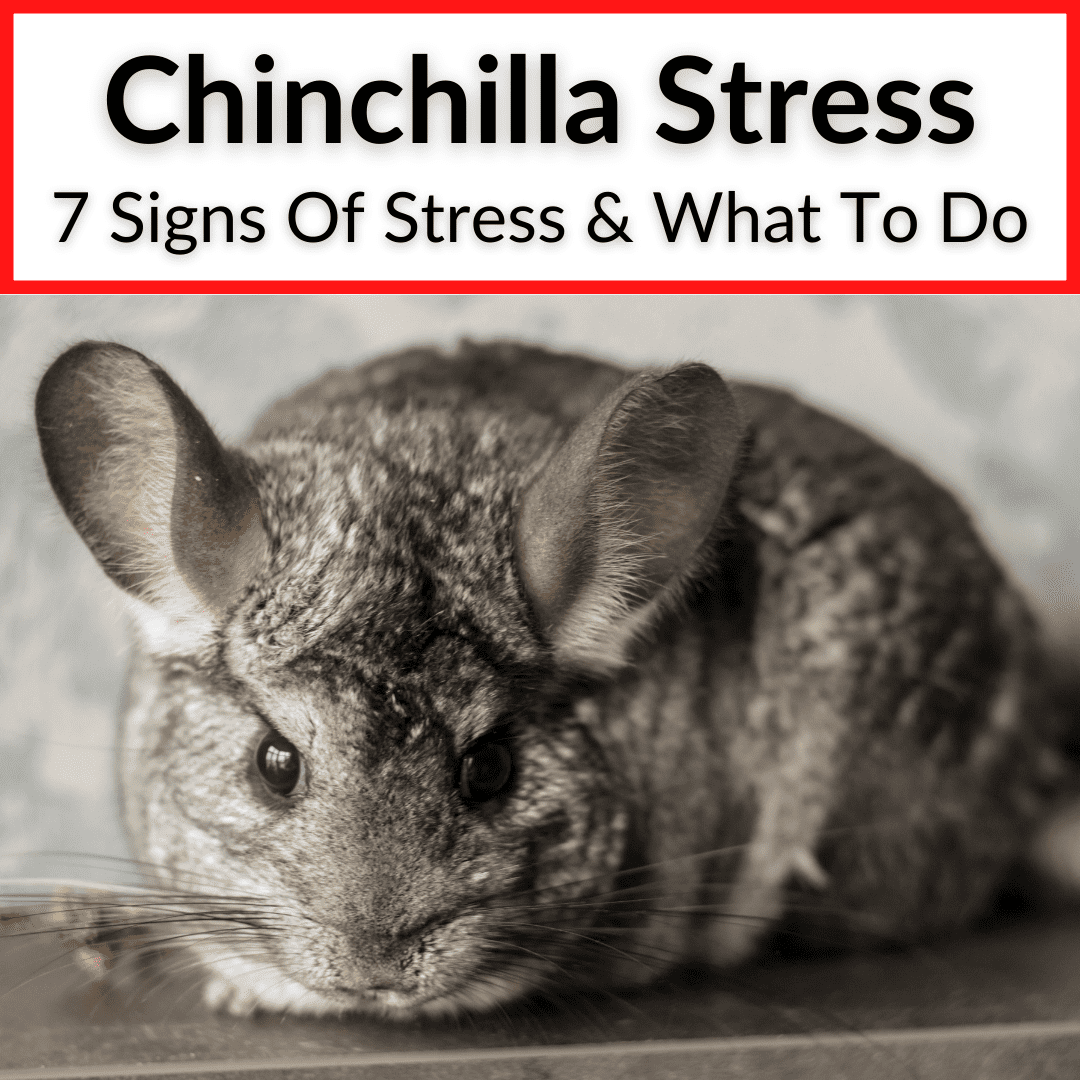
You chinchilla is no different.
A lot of things can cause stress in these little furballs. In most cases, it won’t cause for much concern.
But stress can be dangerous, too.
That’s why it is important to recognize the most common chinchilla stress signs and to know what you can do to alleviate the stress.
Keep reading for a breakdown of the 7 most common indicators of stress in chinchillas, and some tips on remedying that stress.
Contents
Chinchilla Stress Signs
You can recognize tell a chinchilla is stressed if you notice any of the following 7 behaviors or symptoms:
- Making noise and vocalizing (barking and grunting)
- Hiding more than usual
- Chewing fur excessively
- Frantically pacing inside the cage
- Lack of movement or other lethargic behavior
- Reserved or abnormal behavior
- Excessive tooth grinding
Any of these symptoms or behaviors can mean that your chinchilla is suffering from some form of stress.
But that doesn’t necessarily mean there is anything over which you need to be overly alarmed.
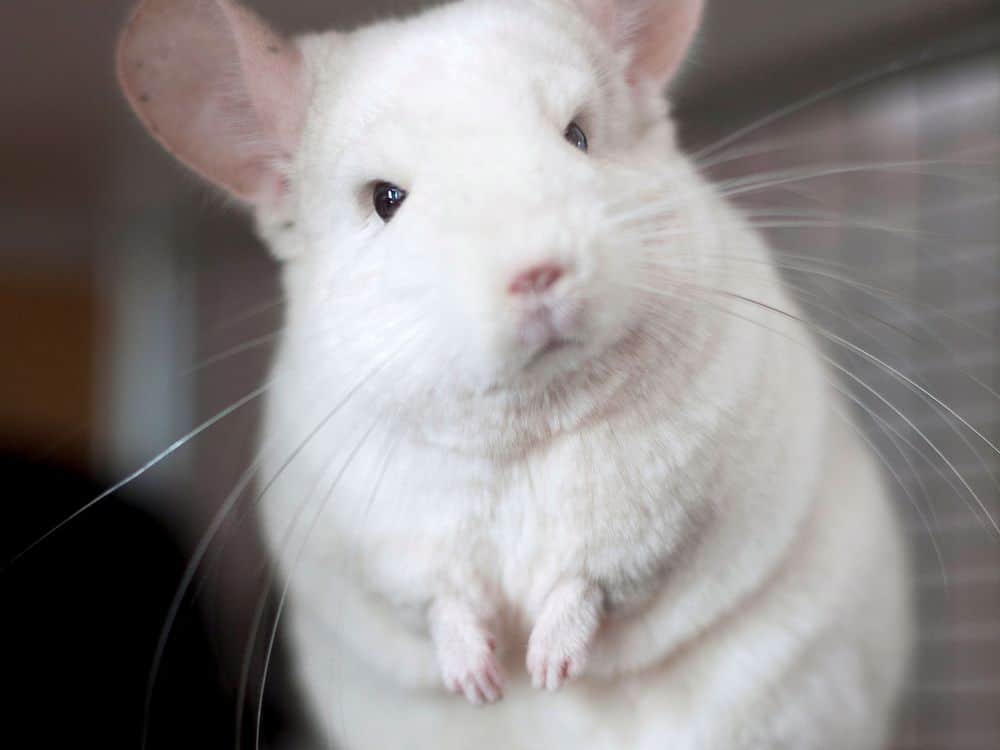
That’s what the rest of this brief post is going to break down for you. By the end of the post, you should have a handle on what signals to watch for that indicate stress most of the time.
You’ll also learn what you can do to help your chinchilla push through the stress and return to the happy and friendly personality to which we are all accustomed.
The critical thing to understand about owning a chinchilla is that they do, in fact, attempt to communicate. If you pay attention, they will let you know what is going on in their lives.
To begin with, let’s break down each of the signs of chinchilla stress a bit further, to help you understand each a bit more clearly.
The 7 Main Indicators Of Stress In A Chinchilla
We briefly listed these 7 signs above, but it is important to dive a bit deeper and take a closer look at each of the chinchilla stress signs individually.
Making Noise And Vocalizing (Barking And Grunting)
This stress indicator is perhaps the hardest to pinpoint. Especially for a new chinchilla owner.
art of this is because chinchillas also like to vocalize and make barking like noises for other reasons.
For example, a chinchilla may vocalize if it hears a loud noise or even to let you know that it doesn’t want to be held in a specific manner.
Sure, loud noises or improper handling can also cause stress, but this isn’t usually something to fret over.
Overall, this is one of the less concerning stress signals on the list.
However, if your chinchilla is like mine, it could mean a more severe problem is taking place.
Why do I say this?
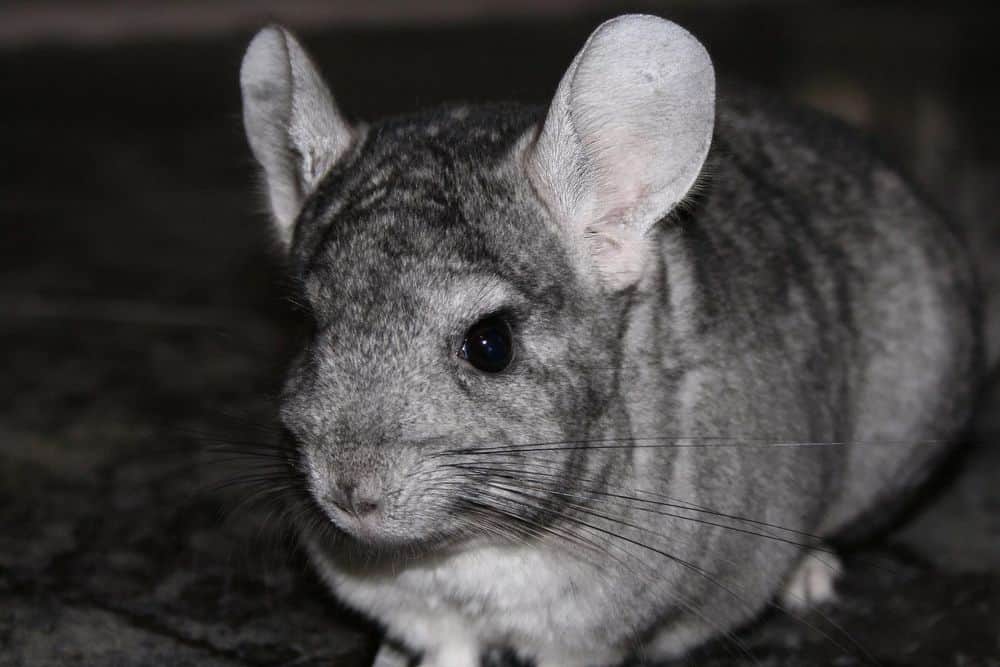
Well, my chinchilla isn’t as vocal as most. She will grunt, but typically only out of pleasure, like when she is being petted or is enjoying something else I’m doing.
When it comes to barking and being truly vocal, she is more reserved and on the quiet side. This is when it becomes essential to understand your chinchilla in general.
If your chinchilla behaves one way most of the time and it begins to act completely differently all of a sudden, it could be a definite indicator that it is stressed out.
At the very least, it indicates that you should check on the situation and see if anything else seems unusual. You may even consider consulting a vet, if necessary.
Simply put, pay attention to the signals and behaviors your chinchilla exhibits.
Hiding More Than Usual
Chinchillas tend to show their emotions in different ways. Let’s assume that your chinchilla is not vocal, just like mine.
Sometimes, they may indicate stress in a different manner, such as hiding.
News flash, it’s vital that the chinchilla cage provides some places to hide. Make sure to fill it with items like a good nest box or even a safe chinchilla tunnel.
Here’s why.
Chinchillas are heavily hunted in the wild. Just about everything wants to eat them. Even humans hunt them for their fur.
While chinchillas do adapt to their new and safer environment relatively quick, they still get frightened easily.
When a chinchilla is stressed, it naturally feels the need to go to a safe place and retreat.
This gives them the same feeling of safety that they experience when they reach a safe hiding place in the wild, for example beneath a dark rock or in other crevices.
These hiding areas inside of the cage allow them to calm down and feel safe during times of high stress.
Without them, your chinchilla is likely to pace frantically around the cage, hoping a miracle hiding spot appears from the sky.
This can cause serious issues, like pacing into a state of overheating.
Always make sure you provide these items inside of your chinchilla’s cage and also make sure you have a large chinchilla cage that can accommodate all of these accessories.
And always ensure that you have the cage and your chinchilla in a room with a chinchilla safe temperature, to avoid any chance of overheating.
To play it extra safe, consider something like a chiller stone pad near, or inside, a hiding box, to give your chinchilla a nice spot to cool down and reduce stress.
- Made of granite stone to keep chinchillas cool and healthy
- Can be placed anywhere inside chinchilla's home
- 6-Inch long, 10-inch wide
Chewing Fur Excessively
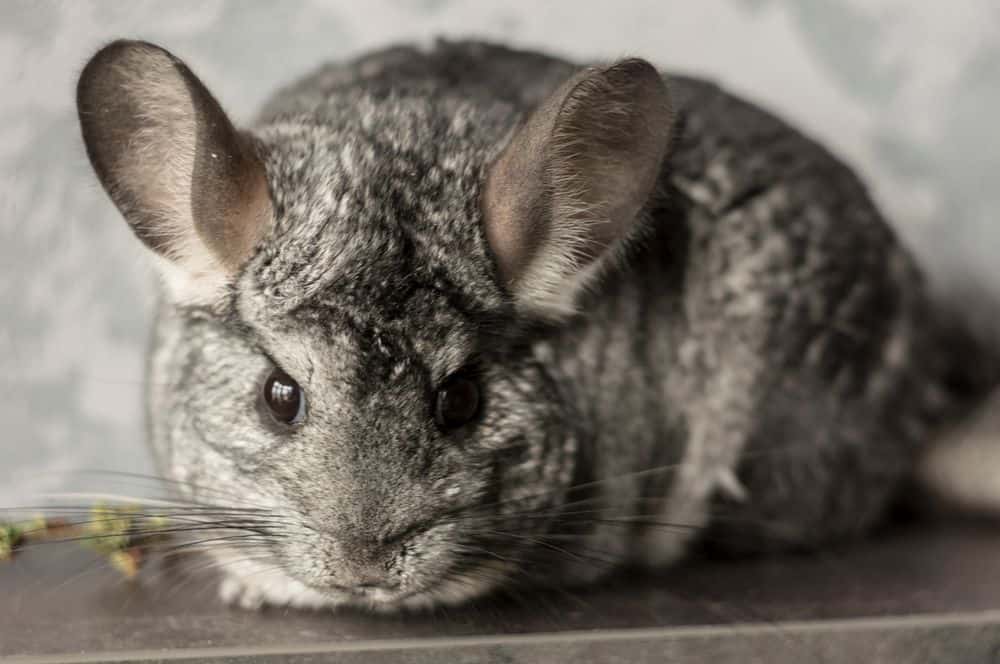
Fur chewing is another excellent way for you to spot chinchilla stress relatively easily. Especially if this is not something your pet commonly does.
Typically, a chinchilla that’s stressed will begin excessively chewing its own fur, or other items inside of the cage, more than usual. It can be toys, accessories, or even the cage bars.
If you notice your chinchilla with excessive bald spots, fur slips, or that it is chewing other items, it is likely stressed or potentially dealing with another illness, perhaps even tooth pain.
Frantically Pacing Inside Cage
A chinchilla that seems highly energized and continues to pace frantically around the cage may be feeling stress.
The reasons for this could vary, such as lack of social activity, pain, or even a drastic environmental change.
If you notice it, be sure to limit significant changes in your chin’s environment or in the area where you keep the cage.
If the frantic pacing persists, you might consider outside help. Perhaps consult a vet to help diagnose the issue. That said, in most circumstances this problem will resolve itself with some patience and love from you.
Lack Of Movement Or Other Lethargic Behavior
On the complete opposite end of the spectrum, let’s assume that your chinchilla is typically happy and outgoing when it sees you.
But all of a sudden, it is acting in the opposite manner and not showing much activity at all. This can also indicate stress, depression, or other issues.
Reserved Or Abnormal Behavior
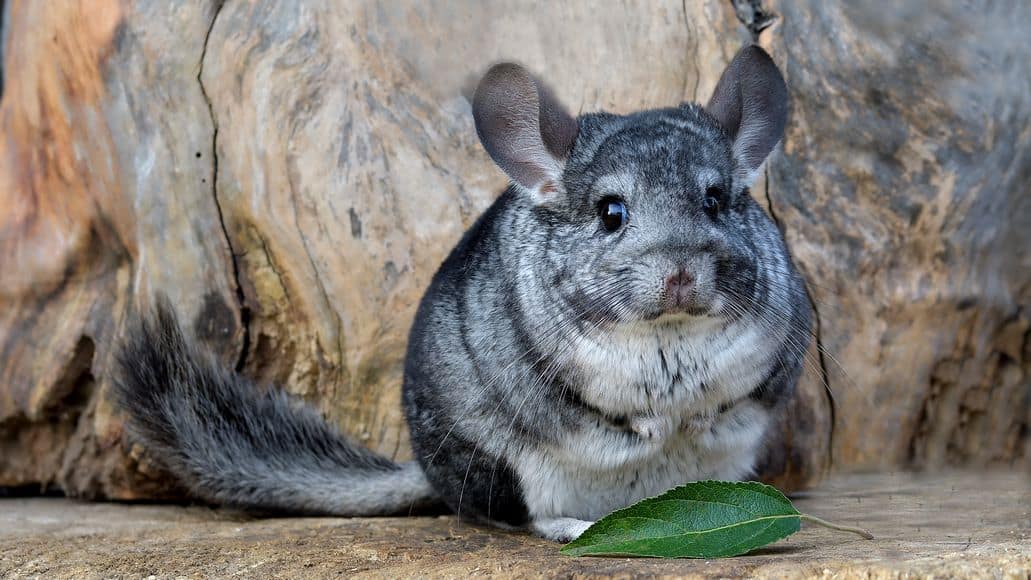
Most of us who have owned a chinchilla for any duration of time have come to understand how our pet behaves and what it typically likes to do.
At least we should.
While all the symptoms we have already mentioned can indicate stress, you also must exercise some common sense to spot stress and other issues with your chinchilla.
Anything that’s abnormal compared to your chinchilla’s normal behavior can indicate something is wrong, like stress.
We will discuss a bit further in this post what you can do to comfort and help your chinchilla as much as possible during these times.
Excessive Tooth Grinding
In general, excessive tooth grinding will indicate pain in your chinchillas’ mouth and teeth, but it can also be a way your pet releases stress.
This is different than chewing on cage bars, chewing their fur, or just chewing excessively in general.
It’s also audible. If this is happening, I would consult a vet.
Teeth are one of the most significant concerns with chinchillas, when it comes to illness or pain in general, because they have teeth that never stop growing.
Out of all the factors we have covered on the list, this is one to pay extra close attention, to so that you can put a stop to any problem before it escalates. Things like chinchilla malocclusion can become extremely serious.
5 Tips To Help Your Chinchilla Deal With Stress
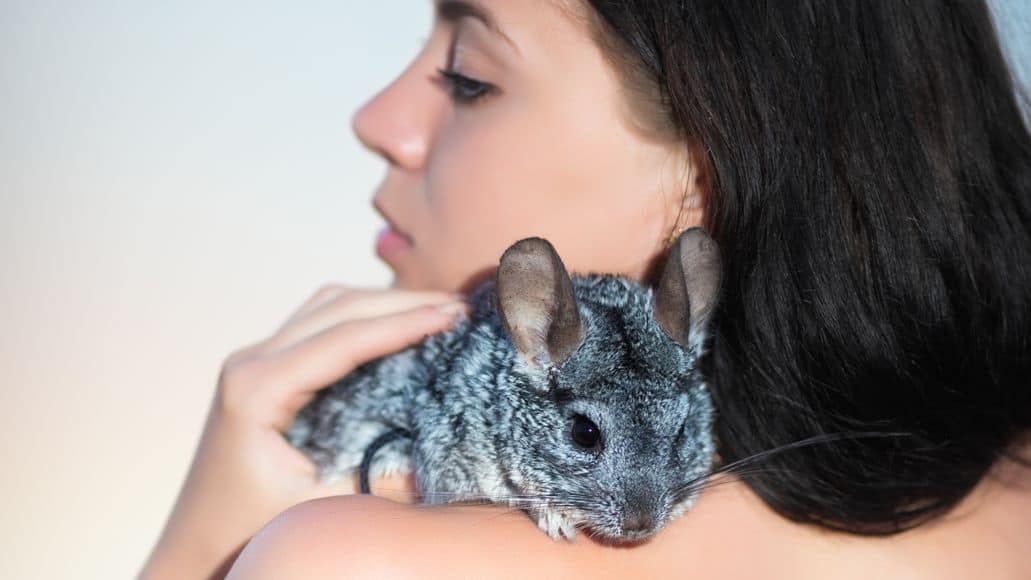
Now that you know how to spot stress in your chinchilla, what can you do to help the situation when it does take place?
I’m glad you asked.
I have 5 additional tips to implement from the get-go, to not only help prevent stress in your chinchilla but to help it return to a happy and healthy state of mind as quickly as possible.
Provide Love And Socialization
Chinchillas are social creatures that want to interact with you with another chinchilla, if that’s a possibility in your household.
Adopting a second chinchilla isn’t always necessary, but if you choose not to, you need to realize that you as the owner are the primary social interaction for your chinchilla.
This means that you need afford time to get your chinchilla out of the cage to play and provide an adequate amount of dust baths.
This means 2 to 3 dust baths per week and, ideally, at least 30 minutes out of the cage per day. Make sure to proof the room to keep your pet safe when it is out of the cage (or use a pop-up play pen).
Chinchillas can get bored and restless. Keeping them mentally and physically stimulated is imperative. Not allowing them time to socialize is a cruel way to keep a chinchilla.
The good news is that it is easier than most people think, once you have gotten into the swing of things. And it’s fun, too!
Provide A Good Cage And A Clean Environment
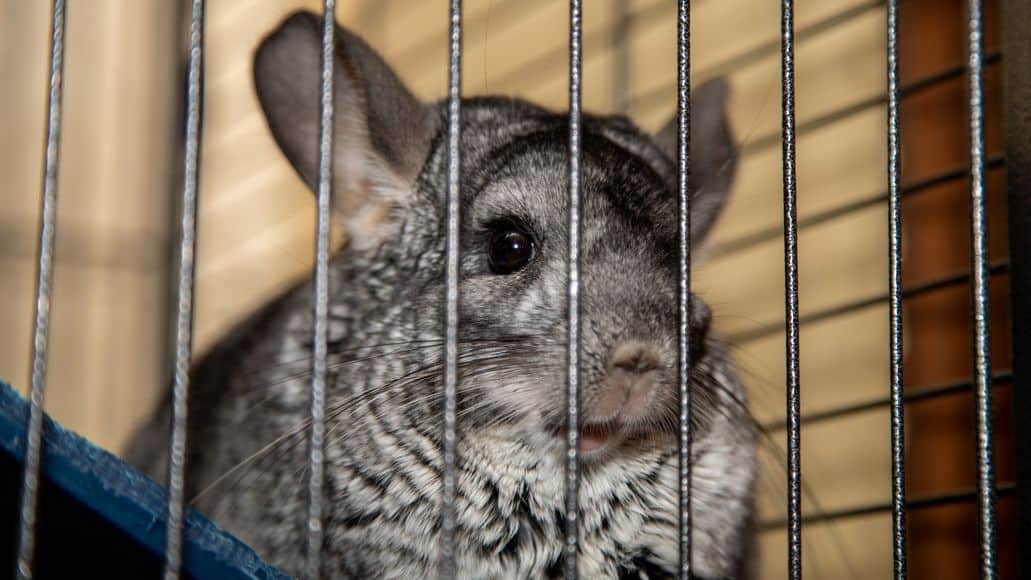
Chinchillas love the ability to jump and climb. You need to give them the opportunity to indulge in this pleasure.
This means ensuring you have a big enough chinchilla cage, especially when it comes to the vertical size of the cage.
Not only does this promote healthy physical activity, but it keeps your chinchilla happy in general.
Remember, they spend 23 or more hours in their cage most of their lives. Make sure they have everything they need in that cage.
Read my article about the best cages for your chinchilla, if you are not sure which one to get.
You can also read about the best accessories for your chinchilla. Toys and other things to keep your pet engaged are also important.
In addition to providing the best habitat possible for your chinchilla, you also need to ensure that you keep up with the basic hygiene needs.
I’m not talking about the dust baths now. I mean making sure that you clean the cage on a regular basis. I also recommend changing from aspen shavings to fleece liners for your chinchilla’s cage.
They are more comfortable, easier to clean, and make for a cozier home. You can view the exact set of fleece liners I use for my chinchilla cage here.
Provide The Proper Diet
A proper diet can not only lead to longer and healthier life but can also keep your chinchilla well balanced and happier overall.
Always limit the number of treats or fruits you provide your chinchilla to avoid issues with its sensitive stomach.
Make sure that its diet consists primarily of timothy hay and the correct formulated chinchilla pellets. And, of course, your chin always needs access to clean water.
Doing this ensures your chinchilla does not suffer from stomach issues and that you will enjoy a long relationship with your new pet for the next 15 to 20 years.
Provide Things To Chew On At All Times
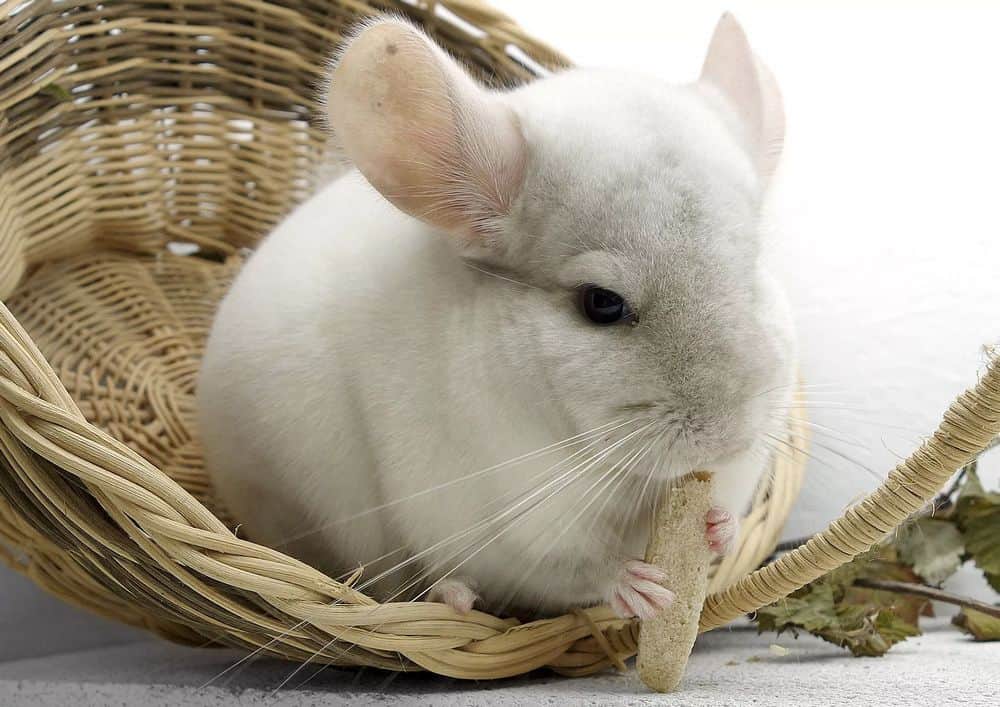
As mentioned previously, chinchillas have teeth that grow constantly for as long as they live. This is common with rodents.
This means that your chinchilla needs to file down its teeth in order to avoid dental issues, overgrown teeth, and the possibility of severe pain and infections.
Make sure to provide enough safe items inside of the cage for your chinchilla to chew.
This can include simple items such as wooden ledges, but you should also always have plenty of apple chew sticks on hand.
These are the chew sticks I give my chinchilla.
I always make sure to keep a large supply of them on hand. 3 to 4 bags of these chew sticks will last you several weeks.
Seek Professional Help When Necessary
I know we all want to help and understand our chinchillas as much as possible. And we would all prefer to avoid costly vet bills.
However, a stressed chinchilla can be serious. It’s essential to understand when to seek help.
If you are sure you have checked all the items off the list that we have discussed in today’s post, and you can’t think of any other ways to reduce your chinchilla’s stress, then it’s time to call the vet.
Doing so ensures you stop the problem before it escalates further. Simply put, do your due diligence and seek help if all else fails.
Can Chinchillas Die From Stress?
Yes, a chinchilla can die from stress, although it will not die directly from the stress. It can die from health issues resulting from the stress. If your pet is stressed for a long period of time and you do nothing to help it, it could end up with various health issues as a result. And those health problems can result in death.
Chinchilla Stress: Final Thoughts
Chinchilla stress can be overwhelming for a new chinchilla owner. I’ve been there.
The good news is that some of the simple steps laid out above can remedy the problem quickly, if you know how to recognize it early on.
Put these tips into place and your chinchilla will ultimately live a long and healthy life, with proper care, of course.
Chinchillas make one of the best family pets a family can choose to adopt. I wish you the best of luck with your new chinchilla ownership.
Share your thoughts and concerns on chinchilla stress.
What other indicators have you noticed with your chinchilla when it comes to spotting stress quickly?
Do you have any other recommendations or remedies for chinchilla stress I haven’t mentioned that you can share with the readers?
Be sure to share your thoughts, stories, and concerns by dropping a comment below.
As always, Chili and I appreciate you stopping by and reading. Thanks again, and we will see you next time.


Chanon says
Hello my name is Chanon
I just got two chinchilla for 2 days
Both are male, one 2 years old another one 4 month. I didn’t mean to get the old one but from the first time I met him. He’s spark me a lot and look like he wanted to come home with me when I first pick them up from the breeder, but when I got home seem like I have a lite problem with an old one because he not jump at all and do things repeatly like walk back and forth. Walk up to one ledge and seem like he doesn’t know where to go next and then he go back down. Sometimes I put him on the high ledge to test him and again he don’t know how to come down or jump to another ledge to come dowm. He just walk and slip from high ledge most of the time. Im not sure what is wrong with him or he need sometime to warm up but it’s not make any sense for chinchilla. At least he should know how to jump. Im not sure is he too chill or stress. By the way the young one definitely fine and super energy, very opposite to the old one. I’m so worry about this because this is my first time having them. And I did research a lot. I’ve been waiting for them almost 4 month but now I got them I suppose to be happy but yes this old one makes me so worry and I love him already. Please give me some advice if you can. Thank you so much.